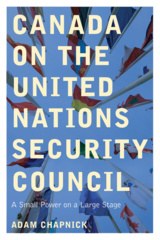
The Middle Power Project describes a defining period of Canadian and international history. During the Second World War, Canada transformed itself from British dominion to self-proclaimed middle power. It became an active, enthusiastic, and idealistic participant in the creation of one of the longest lasting global institutions of recent times – the United Nations. This was, in many historians’ opinions, the beginning of a golden age in Canadian diplomacy.
Chapnick suggests that the golden age may not have been so lustrous. During the UN negotiations, Canadian policymakers were more cautious than idealistic. The civil service was inexperienced and often internally divided. Canada’s significant contributions were generally limited to the much neglected economic and social fields. Nevertheless, creating the UN changed what it meant to be Canadian. Rightly or wrongly, from the establishment of the UN onwards, Canadians would see themselves as leading internationalists.
Based on materials not previously available to Canadian scholars, The Middle Power Project presents a critical reassessment of the traditional and widely accepted account of Canada’s role and interests in the formation of the United Nations. It will be be read carefully by historians and political scientists, and will be appreciated by general readers with an interest in Canadian and international history.
Awards
- 2005, Shortlisted - Dafoe Book Prize, J.W. Dafoe Foundation
This book provokes thought. The historical research is tremendously impressive. Having perpetrated a number of books on the UN, I am ashamed of how little I knew about Canada's early role therein. I am grateful to Adam Chapnick for teaching me how, why and where Canadian influence over the UN Charter can be discerned.
Chapnick's is a timely book ... [this] book offers an important critique of Canada's early contributions to the founding of the United Nations.
Chapnick's focus on Canada's role in the founding of the United Nations (UN) in the final years of the Second World War is both unique and extremely valuable ... This book enhances our understanding of Canada's foreign relations in this formative period ... This is an impressive book, exhaustively researched and convincingly argued. It significantly revises our understanding of Canada's role in the creation of the United Nations and it should be an indispensable resource for anyone interested in Canadian history.
A fresh and critically important alternative to much of the literature on Canadian foreign policy and diplomatic history during this period -- It will become an essential source for understanding Canada’s involvement in developing the United Nations organization.
This book is a valuable corrective to popular misconceptions of Canada’s contribution to the creation of the UN and its subsequent relationship with the organization. Chapnick’s extensive use of foreign records places the story in a broader context that is illuminating.
Acknowledgments / ix
Acronyms / xiii
1 Introduction / 1
2 Two Steps Behind (Beginnings through January 1942) / 7
3 Private Failure: Canada and the UNRRA (January 1942--November 1943) / 22
4 Public Success: Canada and the New Internationalism (January 1942--November 1943) / 36
5 Canada, the British Commonwealth, and the New World Order (February 1943--March 1944) / 52
6 Forked Roads (November 1943--July 1944) / 65
7 Disappointment at Dumbarton Oaks (April--October 1944) / 78
8 Middle Power Politics (October 1944--April 1945) / 95
9 The Public Road to San Francisco (October 1944--April 1945) / 115
10 Growing Up: Canada at San Francisco (April--June 1945) / 126
11 Shaping History (June--October 1945) / 139
Epilogue: Cherishing Illusions / 149
Notes / 153
Bibliography / 189
Index / 207












